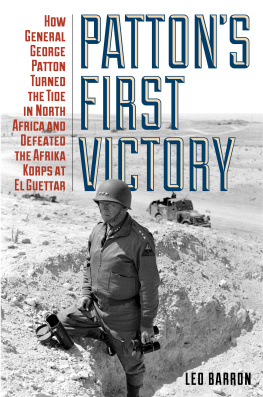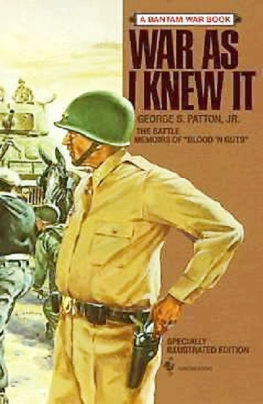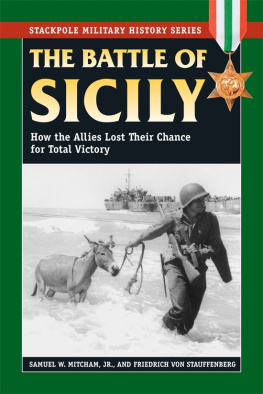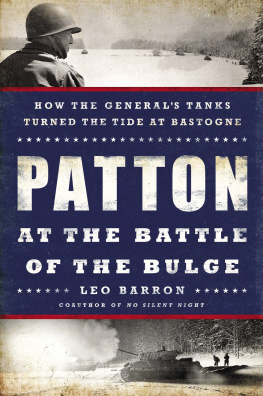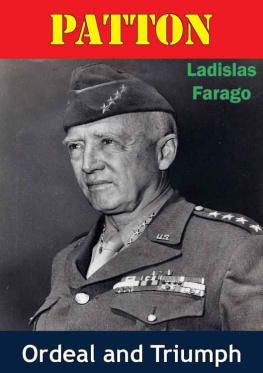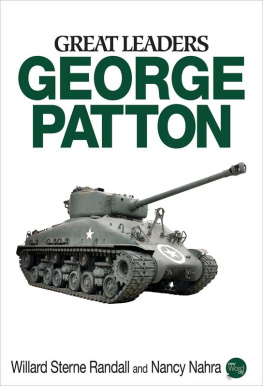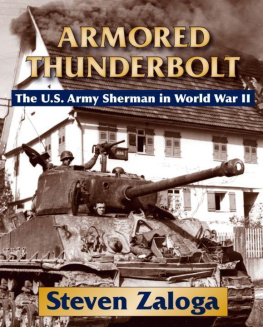PATTON
MILITARY PROFILES
SERIES EDITOR
Dennis E. Showalter, Ph.D.
Colorado College
Instructive summaries for general and expert
readers alike, volumes in the Military Profiles
series are essential treatments of significant and
popular military figures drawn from world history,
ancient times through the present.
PATTON
Legendary Commander
Martin Blumenson
and Kevin Hymel

Copyright 2008 by Potomac Books, Inc.
Published in the United States by Potomac Books, Inc. All rights reserved. No part of this book may be reproduced in any manner whatsoever without written permission from the publisher, except in the case of brief quotations embodied in critical articles and reviews.
Library of Congress Cataloging-in-Publication Data
Blumenson, Martin.
Patton : legendary commander / Martin Blumenson and Kevin Hymel.1st ed.
p. cm.(Military profiles)
Includes bibliographical references and index.
ISBN 978-1-57488-762-4 (hardcover : alk. paper)ISBN 978-1-57488-763-1 (pbk. : alk. paper)
1. Patton, George S. (George Smith), 18851945. 2. GeneralsUnited StatesBiography. 3. United States. ArmyBiography. 4. United StatesHistory, Military20th century. 5. World War, 19391945Campaigns. I. Hymel, Kevin, 1966 II. Title.
E745.P3B545 2008
355.0092dc22
[B]
2008009336
Printed in the United States of America on acid-free paper that meets the American National Standards Institute Z39-48 Standard.
Potomac Books, Inc.
22841 Quicksilver Drive
Dulles, Virginia 20166
First Edition
10 9 8 7 6 5 4 3 2 1
Contents
Preface
Shortly after World War II, when the Allies interrogated Field Marshal Gerd von Rundstedt, the senior commander who opposed the Allied invasion of France, they asked him to rate the skills of his opponents. He is reputed to have said, Patton. He was your best.
Praise for his performance was precisely what George Smith Patton Jr. had wished for and sought all his life. As a child, he aspired to be a soldier, a fighting man. As a youngster, he imagined himself to be a lieutenant general. In school, his written exercises revealed his identification with the military and his knowledge of tactics, intelligence, and maneuver. At age eighteen, he was already searching for what he called the undefinable difference that distinguished a great general from a merely good one.
As a cadet at the Virginia Military Institute and the U.S. Military Academy, Patton applied himself intensely to learning the fundamentals of his profession. He acquired more knowledge and competence in his early assignments in Illinois and Washington, D.C. Striving to become widely known in the Army, he entered horse shows, raced, and played polo. He competed in the 1912 Olympic Games and was a well-known swordsman.
The highlight of his early service was his work along the Mexican border as a member of Gen. John J. Pershings Punitive Expedition into Mexico. What must have seemed to him to be the culminating experience was his participation in World War I, first with Pershings headquarters and later as the foremost American tank expert in Europe as well as in the entire U.S. Army.
The twenty years of peace between the wars were for Patton a time of anxious waiting. He sharpened his military skills and expanded his understanding of warfare, but he suffered from the absence of conflict and feared he was growing too old to fulfill what he called his fate or destiny. His reassignment to the tanks in 1940 marked the beginning of his rise to worldwide fame. Promoted quickly from commanding a brigade to a division, then an armored corps, he drew attention to himself by his participation in the large-scale maneuvers in Tennessee, the Carolinas, Louisiana, and Texas. He created and managed a vast Desert Training Center in the southwestern United States.
Finally, he was selected to lead the U.S. troops designated to invade French Morocco in November 1942, as part of the Allied Operation Torch, the Anglo-American descent on French Northwest Africa. Pattons success in that venture and his subsequent transfer to command the U.S. II Corps in Tunisia, after the American defeat in the Battle of Kasserine Pass, added to his reputation.
He next commanded the U.S. Seventh Army in the invasion and campaign of Sicily. His efforts were a triumph of mobility and audacity. Unfortunately, toward the end of the fighting, he slapped two hospitalized soldiers, assuming they were malingering. He thereby lost the possibility of commanding the American forces in the Normandy invasion.
Relegated to idleness in Sicily for more than four months, Patton finally received the call to report to England. There he took command of the Third Army and prepared his units for their follow-up role in Operation Overlord. He was almost sent home in disgrace when his presence, which was supposed to be secret, was revealed in a speech he gave in Knutsford, England. The misunderstanding blew over, and Patton entered battle in Normandy on August 1, 1944, almost two months after D-Day. Pattons Third Army, activated at a time of great operational fluidity on the continent, sparked the war of movement and turned a local breakthrough into a theater-wide breakout.
He was the focal point in the maneuver to close the Argentan-Falaise pocket and the first to reach and cross the Seine River. He led the exhilarating pursuit of the German forces across northern France until gasoline shortages forced him to stop at the Meuse River.
Pattons army crossed the Rhine River, overran much of Bavaria and Austria, and finished the war in Czechoslovakia. Gen. Dwight D. Eisenhower, the Supreme Allied Commander, wrote to him early in 1945, You have made your Army a fighting force that is not excelled by any other of equal size in the world. Patton was termed in 1948 the outstanding exponent of combat effectiveness in World War II.
Assigned to occupy Bavaria after the war, Patton found himself unsympathetic with American policy. He opposed nonfraternization with the Germans and the punishment of Nazi Party members. Because of his obstinacy, Eisenhower relieved him of command of the Third Army and transferred him to the Fifteenth Army, which was writing the lessons learned from the war.
About to depart the theater for Christmas leave at home, Patton was involved in a freak automobile accident. Paralyzed, he lingered in the hospital for eleven days before dying on December 21, 1945. The official announcement of his death the following day carried this tribute: Probably no soldier has had a greater compliment paid him than that given General Patton by his most powerful and skillful opponents. He was termed the ablest American field commander faced by the German Army on any front.
An American folk hero, Patton has been both loved and disparagedloved by those who worked for him and understood his exuberance, warmth, and devotion and disparaged by those who knew him less and loathed him for his harsh methods, his overbearing personality, his arrogance, his profanity and the sheer wrath of his temper. He was the best American combat general this nation produced.
Martin Blumenson did not live to see the completion of this book, but we did work together on it every Wednesday night until he could work no more. He had no peer when it came to understanding Patton, and it was an education seeing him work.
Other people contributed to this book. At the top of that list is Merry Pantano, who brought Martin and me together for this project. Martin was originally set to write the book but declined. I told Merry that I would help him just to have the opportunity to work with him. She set up the whole project, and Martin made sure we were coauthors.
Next page

